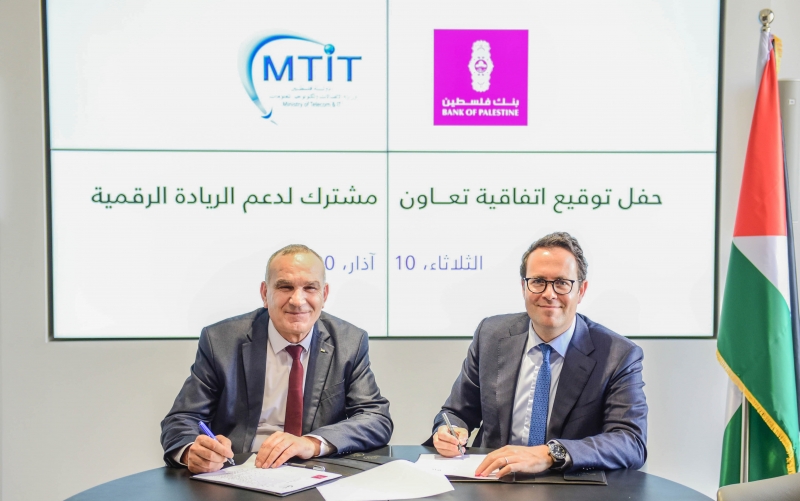
The Ministry of Communication and Information Technology and the Bank of Palestine have signed a memorandum of understanding to support digital entrepreneurship for youth in Palestine. The memorandum was signed at the margin of the closing event of the programming winter camps, implemented in 19 camps organized throughout the West Bank and Jerusalem and implemented by Jeel Code, in partnership with the United Nations Relief and Work Agency for Palestinian Refugees and with the support of Bank of Palestine.
The signing ceremony was organized in restricted form at the Headquarters of the General Administration of the Bank of Palestine on Tuesday 10 March 2020, in the presence of H.E. Dr. Ishaq Sader, Minister of Communication and Information Technology, Mr. Hashim Al Shawa, Chairman of the Bank of Palestine Group, Mr. Rushdi Alghalayiny, the General Director, Mr. Hijazi Al Natsheh, Director of Jeel Code, and a small number of representatives of the different partners.
This project falls within the framework of a common effort to develop and enhance the government’s ambition to implement joint projects that support young Palestinian talents and invest in their creativity and the development of their capacities. The project was implemented in collaboration with Global Shapers East Jerusalem Hub and involves a series of social initiatives that stem from the World Economic Forum and are organized in 408 cities throughout the world. These camps were organized with the aim to train new generations and students in programming as a basic skill for the future and teach children “logical thinking, creativity, problem solving and self-confidence.”
The project involved different phases. Trainers and teachers were first trained in programming, followed by the students - about 400 participants from the West Bank, ages ranging between 9 and 16 years – who trained to become producers rather than just consumers. They were basically trained in the seven skills of programming: serial execution, loops, branching operations, mutability, logical operations, database design and sub-routines. Learning these skills should allow them to become more self-reliant and more capable of managing their own lives.
Dr. Ishaq Sader, Minister of Communication and Information Technology, has confirmed the value of continued and serious collaboration within this programme and the importance of the camps for the children in that they provide them with the technical and creative skills necessary for programming, contribute to establish a self-reliant generation capable of solving its own problems, and enhance the value of self-learning among them. In addition, Dr. Sader announced a huge initiative that will target the creation of one million programmers over the next five years, which will include Palestinian youth from within and without Palestine. This initiative aims to benefit from and expand the experience of the present project and build on its results through future complementary ones.
Dr. Sader commended the organisers of this initiative, which will enhance collaboration between the public and private sectors in a bid to build knowledge in this ever-evolving field. He also praised the role of Bank of Palestine in enhancing Palestinian creativity and leadership at different levels.
Dr. Hashim Al Shawa, Chairman of the Bank of Palestine Group, stressed the importance of such a memorandum, which opens the way for youth to new perspectives in technological systems that permeate important aspects of life including economic, social and educational, and provides them with opportunities for more creativity and for inspired technological solutions for the future.
In addition, UNRWA corroborated the value of collaborating with the Ministry and reiterated its wish to develop and sustain this collaboration in the future, inasmuch as it brings benefits to refugee children and impacts their future. According to UNRWA, integrating children in such activities is of special value because through learning, technology and creativity, it sets them on the right course for the future.
This initiative, the scope of the partnership it represents and the volume of participating students who enjoyed the learning opportunity it offered, are proof of its achieving its objectives. Proceeding towards developing the skills of these students as well as the skills of others in the future is a lever for developing the skills of a generation who will in turn be agents for development in the future.
Mr. Rateb Al Rabi, founder of Global Shapers East Jerusalem Hub, explained that the organization is proud of the achievements and benefits that this training has accomplished; it is also proud to have contributed to networking among the different stakeholders from the private, public and government sectors, which has been elemental in bringing this project to its success.
Due to the spread of information technology and the internet, it is worth mentioning that programming continues to be at the core life in its different dimensions all over the world, hence the need to teach it to children. At the same time, it is an exciting and creative activity that appeals to children: it develops their strategic thinking and their problem solving skills in addition to helping them formulate their own codes and programs as well as other life skills.